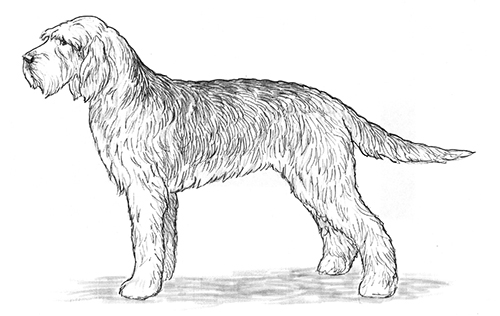Barak
Scenthound Group
The goals and purposes of this breed standard include: to furnish guidelines for breeders who wish to maintain the quality of their breed and to improve it; to advance this breed to a state of similarity throughout the world; and to act as a guide for judges.
Breeders and judges have the responsibility to avoid any conditions or exaggerations that are detrimental to the health, welfare, essence and soundness of this breed, and must take the responsibility to see that these are not perpetuated.
Any departure from the following should be considered a fault, and the seriousness with which the fault should be regarded should be in exact proportion to its degree and its effect upon the health and welfare of the dog and on the dog’s ability to perform its traditional work.
History
The Barak was registered with FCI in 1965 under the name of Illyrian Hound. In 1973 the name was changed to Bosnian Broken Haired Hound (or Bosnian Coarse Haired Hound), and the breed is called the Barak.
The Barak was recognized by the United Kennel Club In 2006.
General Appearance
A robust, shaggy haired dog with a coat that is reddish yellow or earthy grey.
Characteristics
Lively, courageous and persistent.
Head
SKULL
The skull is medium width, and narrows towards the nose. The forehead is slightly convex, and the occipital protuberance is well pronounced. The stop is moderate.
MUZZLE
The muzzle is a little longer than the skull. It is rectangular in shape and covered with a bushy moustache and beard. The nasal bridge is straight. The lips are tight and somewhat thick, and are fully pigmented.
Disqualification: Lips pink without pigmentation.
TEETH
The Barak has a complete set of evenly spaced, white teeth meeting in a scissors bite.
Serious Fault: Level bite.
Disqualification: Missing teeth.
NOSE
The nose is large, with well developed nostrils. It is black or brown, depending on the color of the coat.
Disqualification: Dudley nose.
EYES
The eyes are large, oval in shape, and chestnut brown in color. The expression is intelligent and playful, and the eyerims are fully pigmented.
Disqualification: Eyerims pink without pigmentation. Yellow eyes. Wall eyes.
EARS
Moderately high set, broad, medium long and pendulous, the ears are quite thick and get thinner and rounded towards the end.
Neck
The neck is arched, and increases in width towards the shoulders. There is no dewlap.
Forequarters
The shoulder blade and upper arm are long, sloping and muscular, and meet at an angle of nearly 90 degrees.
FORELEGS
The legs are straight, strong and muscular. The elbows are close to the body and the pasterns slope slightly.
Body
In proportion, the body is slightly longer than tall by approximately 10%. The chest is fairly wide and reaches to the elbow in depth. The withers are moderately pronounced, and the back is broad and muscular. The topline slopes gently towards the croup. The loin is short and muscular and the croup is broad and slightly sloping. The belly is slightly tucked up.
Hindquarters
The hindquarters are well angulated.
HIND LEGS
The upper thigh is broad and muscular. The lower thigh is long and oblique. The hock joint is strong and the rear pasterns are short and perpendicular to the ground.
Feet
Cat feet, with well knit toes, hard pads and strong nails.
Tail
Thick at the base, tapering towards the tip and reaching to the hock in length. Carried in an upward curve.
Coat & Skin
The coat is long, hard, shaggy and tousled, with a dense undercoat. The skin is elastic, tight fitting and well pigmented.
Color
Primary color can be wheaten yellow, reddish yellow, earthy grey or blackish. White markings are often found on the head, under the throat, below the neck, on and under the chest, the lower parts of the legs and the tip of the tail. There may be tricolor markings.
Disqualification: Any color other than those described in the standard.
Height and Weight
Ideal height for males is 20.5 inches. Females are slightly smaller. Ideal weight for males is 44 pounds; a little less for females.
Gait
Long, with energetic strides.
Disqualifications
(A dog with a Disqualification must not be considered for placement in a conformation event, and must be reported to UKC.)
Unilateral or bilateral cryptorchid.
Viciousness or extreme shyness.
Albinism.
Lips pink without pigmentation.
Missing teeth.
Dudley nose.
Eyerims pink without pigmentation.
Yellow eyes.
Wall eyes.
Any color other than those described in the standard.

Looking for a Dog?
Find a dog that will fit your family.
Note: The breeders on this list are not endorsed by UKC.
©Copyright 2006, United Kennel Club
